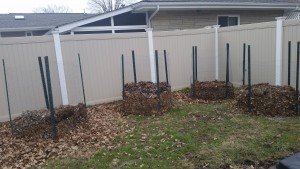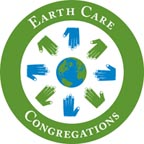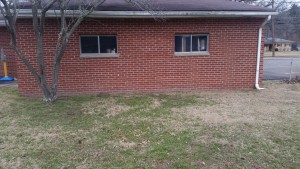When most people plant a garden, they pretty much start and end with what kind of produce they’re looking to grow. If they have a need for potatoes, corn, carrots and green beans, then that’s what they’ll plant.

These compost bins have been erected at Riverlawn Presbyterian Church in St. Albans, WV, part of the church’s pledge to be an Earth Care Congregation.
The worshippers at Riverlawn Presbyterian Church in St. Albans, WV, are not your average garden growers. They’re taking many other factors into producing a garden, like if the seeds are genetically modified, what crops will be the best at keeping the soil rich and which plants will keep away bugs in order to help the other ones survive without using pesticides. And that’s why Riverlawn is a certified Earth Care Congregation.
Thanks to everything from sermons to planning toward making sure its building is energy efficient, Riverlawn has earned the status of “Earth Care Congregation” from Presbyterian Church (USA) Environmental Ministries. Earth Care Congregations are ones that have committed to the “Earth Care Pledge” and accomplished a specific number of actions in various fields related to caring for God’s Earth.
“We’re trying to be good stewards and trying to work this into our congregation as far as learning, applying and teaching all the different aspects,” said Julie Wandling, a member of Riverlawn’s Creation Care Team.
She added, “There’s a big difference when you’re a spectator of creation and when you’re in creation.”
Helping to preserve the earth is right up Wandling’s alley considering she is an environmental scientist who regularly works with the state of West Virginia. Her passion for the environment fits in perfectly with what Riverlawn is trying to accomplish.
Responding to the General Assembly’s “Call to Restore the Creation,” a church must complete a questionnaire that reviews its commitment to the environment through worship, education, facilities and outreach. The church is then given a score based on its answers, and that number determines if it is an Earth Care Congregation.
There are currently four other churches in the bounds of the Synod of the Trinity that are Earth Care Congregations. They are First Presbyterian Church in Clarks Summit, Glenshaw Presbyterian Church, Pine Street Presbyterian Church in Harrisburg and Swarthmore Presbyterian Church.
Among Riverlawn’s initial attempts to become an Earth Care Congregation were teaching the congregation the proper ways to be environmentally conscious. Riverlawn also uses its projector screen and electronic mailings to help reduce printed materials and has recycle bins located throughout the church for things like bulletins and inserts to be discarded into.
The youth are targeted through educational lessons and service projects during the church’s Wednesday Family Night activities, and the youth group is in charge of promoting and participating in stewardship events. The youth are also tasked with providing at least one earth care awareness drama, and children are asked to create earth care-themed banners and participate in a course on earth care.
Elsewhere, Riverlawn’s Creation Care Team gives opportunities for church families to participate in Creation Care efforts through donations of supplies, materials or taking part in activities, such as collecting leaves for compost piles or assistance with the upcoming garden. There’s an ongoing emphasis for creating habits for things like the changing of thermostats, turning off lights and checking water in the bathrooms to improve stewardship. Another push is for the use of energy-efficient appliances, and an earth care bulletin board has also been created.
With the teaching aspect helping to get the ball rolling, Riverlawn is looking to be more active in the “doing” phase of things in 2015.
Among the goals for the congregation this year is the construction of a community garden. The church asked its worshippers for fencing and stake posts that could be used for the garden, and it has already built four compost bins where leaves from the church grounds will help provide soil. Another way the congregation is pitching in is by donating egg cartons, which will be given to the children to allow them to begin their own garden, or they can return the seedlings to help start Riverlawn’s garden.
“We’re just trying to influence them (the children) on gardening skills and just to be part of what’s going on here, having them help us with planting in the gardens and maintaining the raised beds,” Wandling said of trying to incorporate the youth into the act.
Once the garden itself is built, many steps will be taken to make sure it’s eco-friendly. One thing Riverlawn is looking to do is put filled, small-holed water bottles in the ground, allowing for just the right amount of water to get to the plants. A rain barrel is also in the plans as another method to keep the plants irrigated.
“We’re trying to build in different approaches of recycle and reuse,” Wandling commented.
As for what is exactly planted in the garden, there’s plenty of thought going into that as well. Among the first requirements is that the seeds are not genetically modified because GMO seeds may cause risks to human health, the environment and food crops. A second thought process centers on what type of companion-style planting will be done in the garden.
“We don’t want to use pesticides and fertilizers and things like that if we can help it,” Wandling said. “We want it to be a more natural kind of gardening, and we want those kinds of skills to be relayed to the congregation and to the kids. The companion gardening really helps, and some of those benefits are that if you put certain types of plants together that the one may need certain types of nutrients than the other, so they help each other get better established. And some other plants are just naturally more bug repellent, so it will help whatever plant’s near it.”
The early thinking is that things like tomatoes, green peppers, squash, zucchini and cucumbers would be good fits for the garden. Some onion plants are able to keep bugs away, Wandling said, so they may also find their way into the plans. Spices like basil are also good companion plants, she added.
“Ultimately, if we do well, then we can add to it next year and be a little bit bigger,” Wandling said. “What better way to get these skills across to the children and the congregation and help them get involved in all of the process? … Another part to it is to get folks to think about making better food choices and establish healthier eating habits.”
Anything that is bought for the garden will be purchased locally in order to 1) support the local businesses and 2) “reduce our carbon footprint.” Wandling described “carbon footprint” in this way: “When you’re buying things from bigger distributors, some of that stuff’s being shipped, sometimes across the ocean, and there’s just a lot of energy being spent to process and get it to the place where you’re purchasing it. If we buy it locally, and they’re making it right here, then we’re just driving 10 miles to go get it and bring it back. Obviously you can’t always do that; if we are going to make purchases, it’s something to consider.”
Riverlawn is planning to dedicate its community garden during its Wednesday Family Night in April, which happens to coincide nicely with Earth Day. The planting of the seeds for the garden will be connected to a Bible lesson centered on the Parable of the Sower to teach youth and to emphasize the actions Riverlawn has put in place during the preparation and care of the garden. The produce grown from the garden will be given to the youth in the church to sell to the congregation, with the money in turn being put back into the garden and other “Earth Care Congregation” activities.
Also on Earth Day Week Sunday, a sermon, scriptures, music and service will be centered on the “Stewardship of Creation.”
“Our conviction to care for God’s Creation, and involve those around us, is directly linked to our faith and our identity in Jesus Christ,” said Riverlawn pastor the Rev. Chris Kilbert. “After all, our Lord frequently used aspects of the creation in his teachings and parables to reveal the nature of our King and the kingdom, as well as our call to exhibit that kingdom.”
Aside from the garden, Wandling said the church is also looking into assisting the local animal shelter by getting the youth to purchase food and litter and bring in newspapers and blankets for bedding. A community recreational event on the Coal River, along which the church is located, is another idea that has come up. It would coincide with an end of summer/back to school night and would include activities like kayaking and canoeing for people in the area.
It’s all part of a blueprint that will hopefully make Riverlawn Presbyterian Church an even more fitting “Earth Care Congregation,” something that’s turning into a meaningful program for the congregation.
“Working together and fellowship, that’s been a real blessing for us adults,” Wandling said. “It’s an opportunity to work together for a common goal.”


